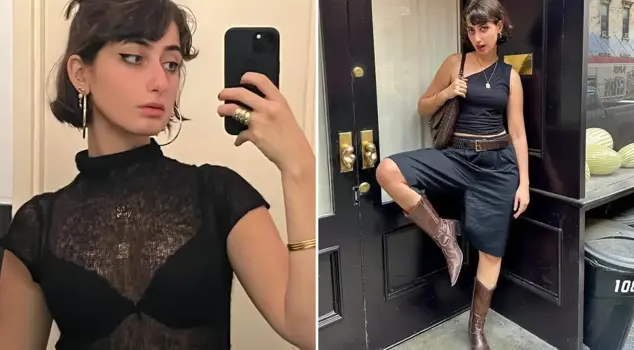
06.11.2025 14:21
The new mayor of New York, Zohran Mamdani's wife, Rama Duwaji, has become the youngest "first lady" in the city's history. Although the Syrian-born artist, who explores Middle Eastern themes in her works, did not appear in her husband's campaign, it is noted that she played an important role behind the scenes.
34-year-old Zohran Mamdani, who won the mayoral elections held in New York, the largest city in the United States, became the city's first Muslim and South Asian mayor. Following the victory, details about Mamdani's newlywed wife, 28-year-old Rama Duwaji, began to attract attention.
Newly elected mayor of New York, Zohran Mamdani, expressed special thanks to his wife, Rama Duwaji, who stood by his side during his victory speech. Mamdani introduced his wife Duwaji to the crowd, saying, "My incredible wife, Rama, my life! There is no one else I would want by my side right now and at every moment!"
THE YOUNGEST FIRST LADY
28-year-old Rama Duwaji received the title of the youngest "first lady" in New York's history with Mamdani's election victory on Tuesday night. Duwaji, an artist of Syrian descent from New York, often incorporates Middle Eastern themes into her works. Her works have been featured in major outlets such as BBC News, The New York Times, The Washington Post, Vice, and Tate Modern.
Mamdani stated in a social media post on May 12, "My wonderful wife Rama is not just my wife; she is an extraordinary artist who deserves recognition on her own," and announced that they had married three months ago. Duwaji humorously responded to this post, saying, "Oh my God, I really exist."
THEY MET ON A DATING APP
Zohran Mamdani and Rama Duwaji met on a dating app called Hinge. Mamdani joked in an interview with The Bulwark magazine, "So there is still hope in these apps."
THE QUIET POWER IN THE CAMPAIGN
Although Duwaji was not seen for a long time during the election campaign, according to CNN, she played an important role behind the scenes. The logo and typography designs in yellow, orange, and blue tones for the campaign were prepared with Duwaji's contribution.
Her opponents criticized Mamdani for "hiding" his wife. Mamdani responded to these claims on social media:
"If you look at Twitter today or any day, you see how ruthless politics can be. I usually don't care about death threats or calls for deportation, but when it comes to my loved ones, it changes. You can criticize my views, but not my family."
SURNAME OF SYRIAN DESCENT, BORN IN HOUSTON
Born in Houston, Texas, Duwaji moved to Dubai with her family when she was nine years old and later studied in Qatar for a while. Her family consists of Syrian Muslim immigrants from Damascus.
The artist, a graduate of Virginia Commonwealth University, later earned a master's degree in illustration from the New York School of Visual Arts. On her personal website, it states, "She explores the nuances of sisterhood and community experiences through drawing-based portraits."
ART AND ACTIVISM
Duwaji's works are often in black and white, depicting scenes from the Arab world. In 2022, her artworks were featured in the BBC World Service documentary titled "Who Killed My Grandmother?"
The artist has criticized American imperialism, Israel's actions in Gaza, and human rights violations against Palestinians in her social media posts. This stance parallels her husband Mamdani's political views.
"ART IS INHERENTLY POLITICAL"
During the pandemic, Duwaji stayed with her family in Dubai for a while. In an interview with the website YUNG in April, she spoke about developments in the Middle East, the possible return of Donald Trump, and the increasing influx of immigrants:
"I won't lie, things are dark in New York right now. I worry for my friends and family. I feel like everything is slipping away from me. With so many people silenced out of fear, the only thing I can do is raise my voice about what is happening in the U.S., Palestine, and Syria."
In the same interview, Duwaji also touched on the political aspect of art, quoting musician Nina Simone:
"I believe everyone has a responsibility to raise their voice against injustice, and art has the power to spread that. I don't think everyone should make political art, but the way art is produced, funded, and shared is inherently political. Even producing art as a refuge in the face of the horrors we see in the world is political to me. Because it is a response to what is happening around us."
Elbette, mevcut HTML içeriğini bozmadan metni İngilizce'ye çevirebilirim. Ancak, çevirmemi istediğiniz metni belirtmediniz. Lütfen çevirmemi istediğiniz metni paylaşın, böylece size yardımcı olabilirim.